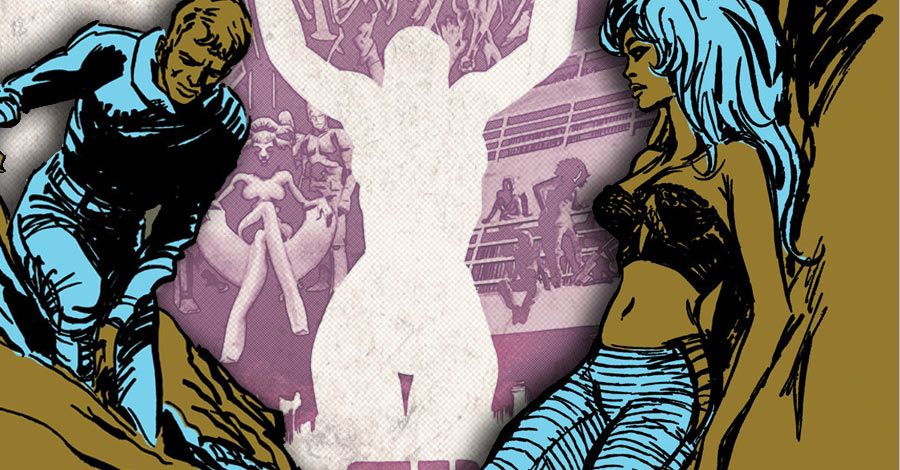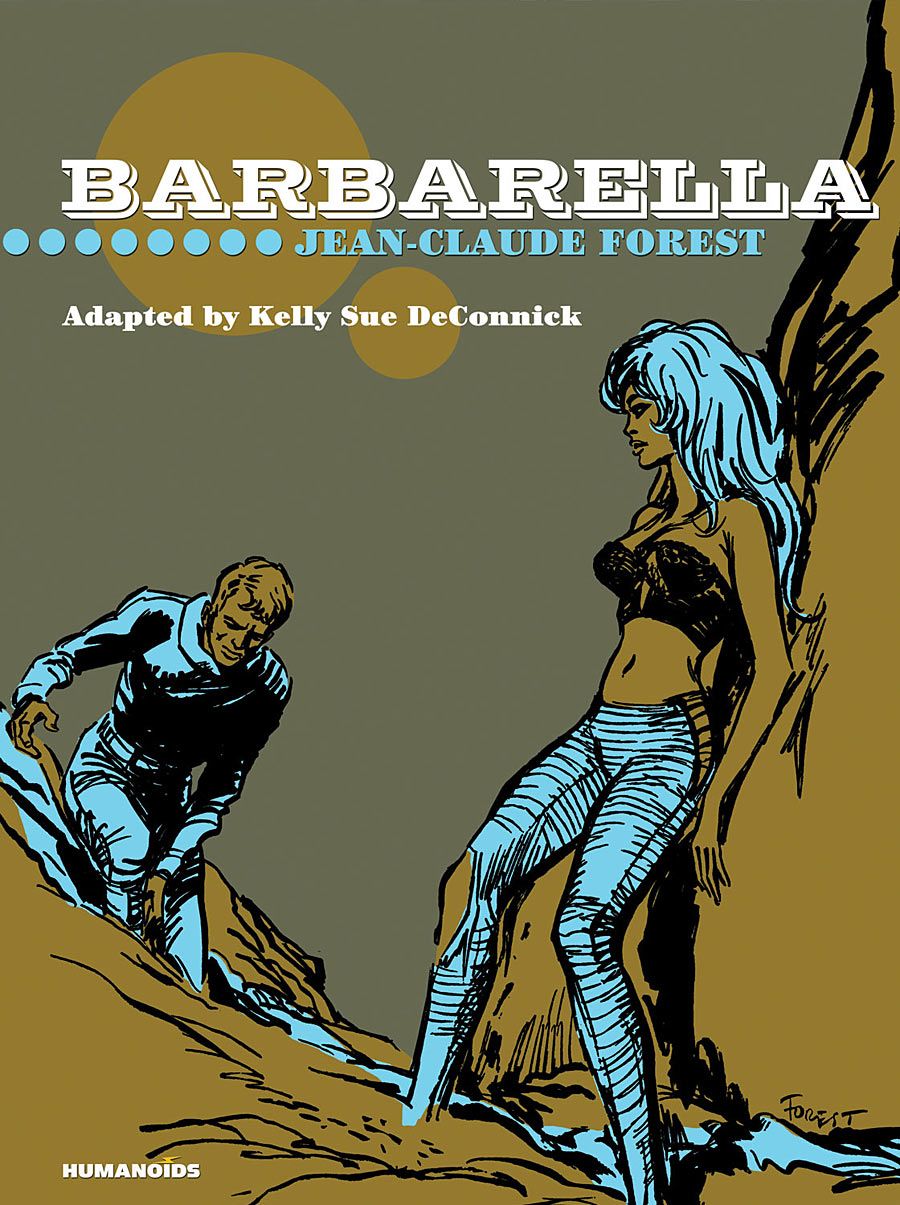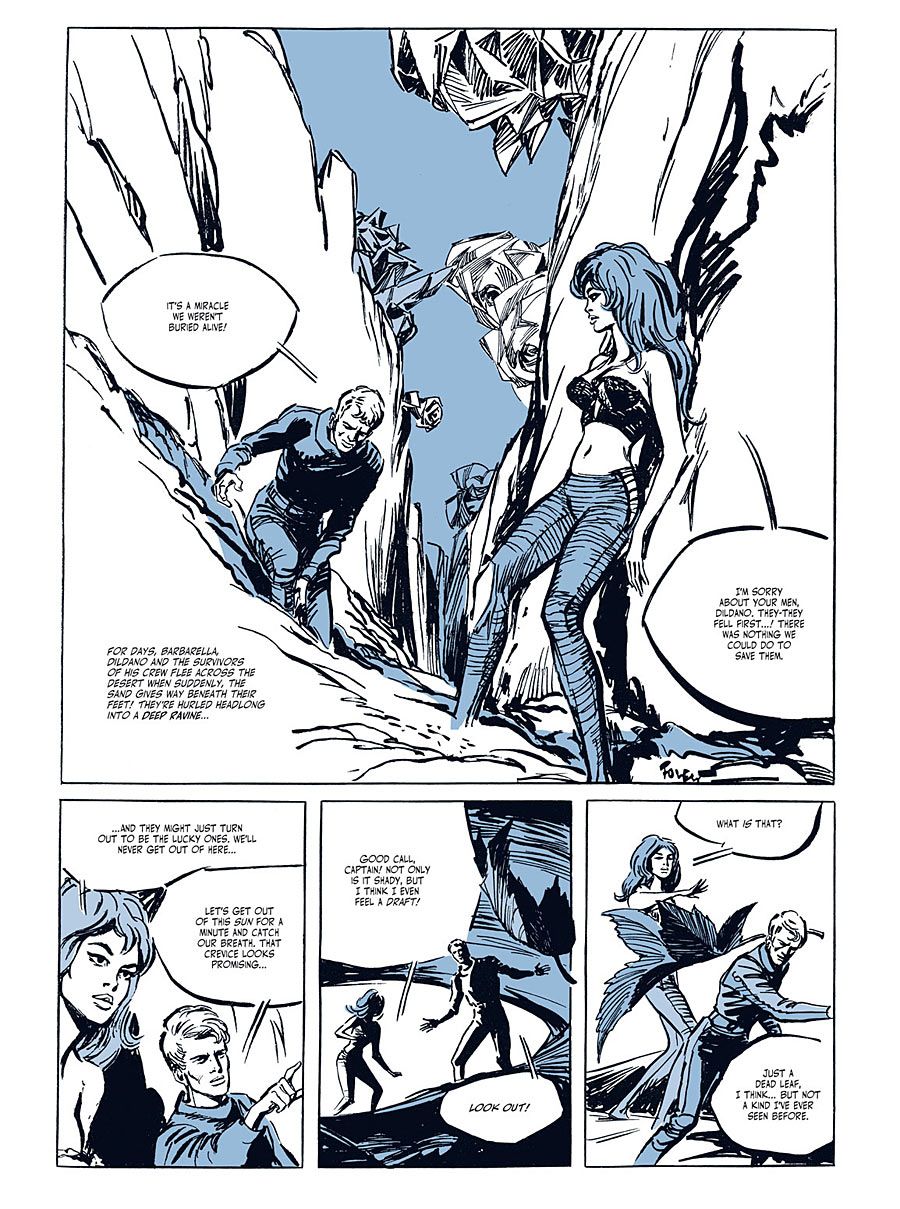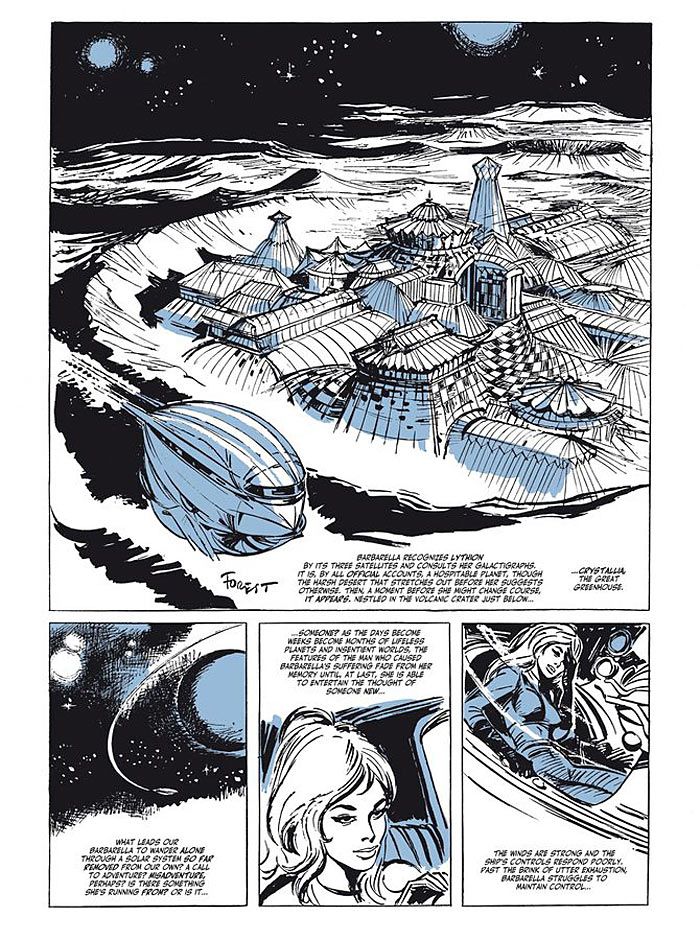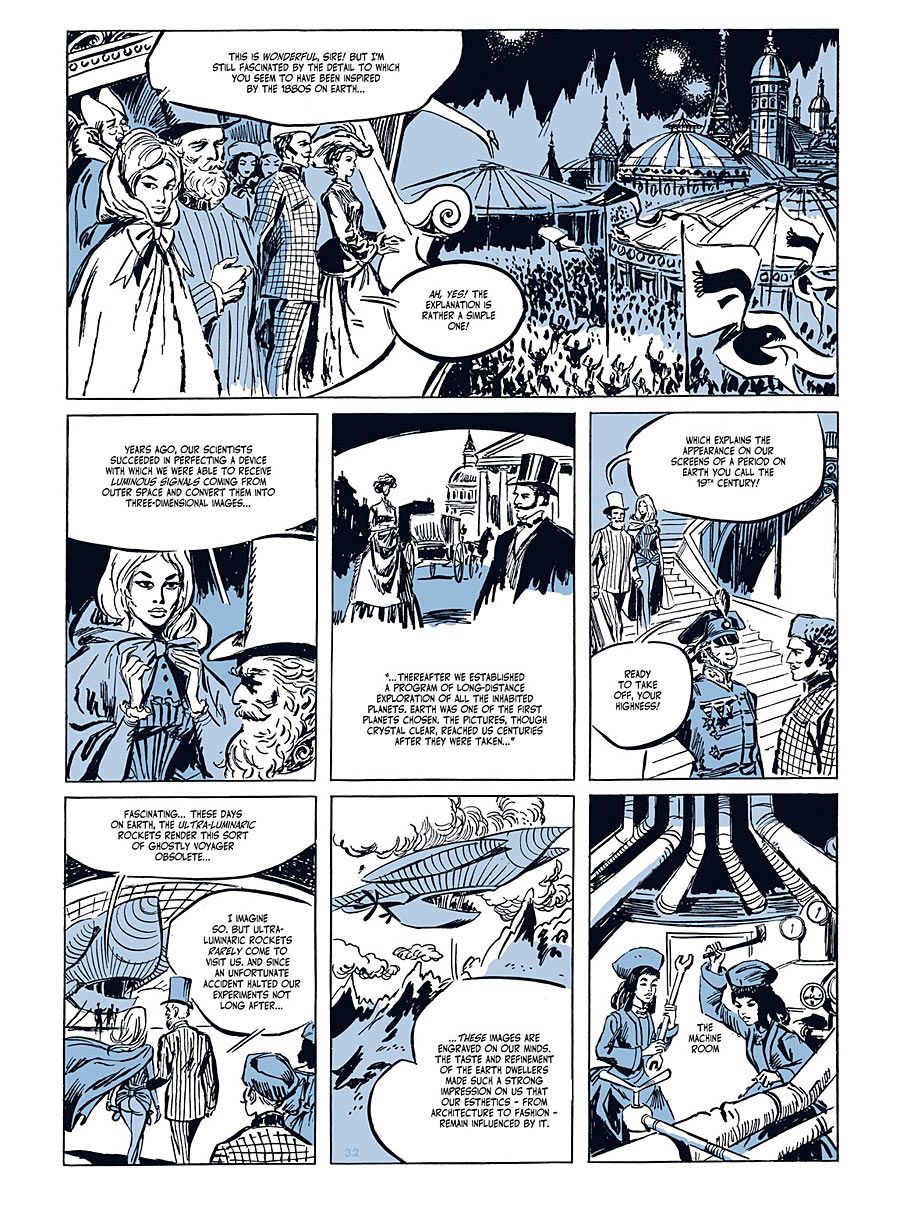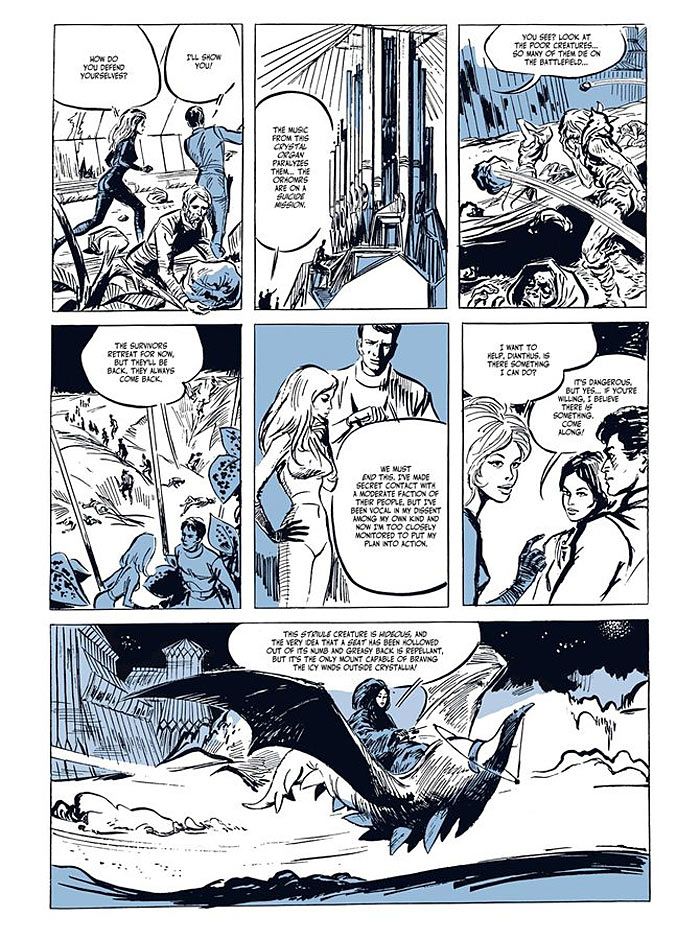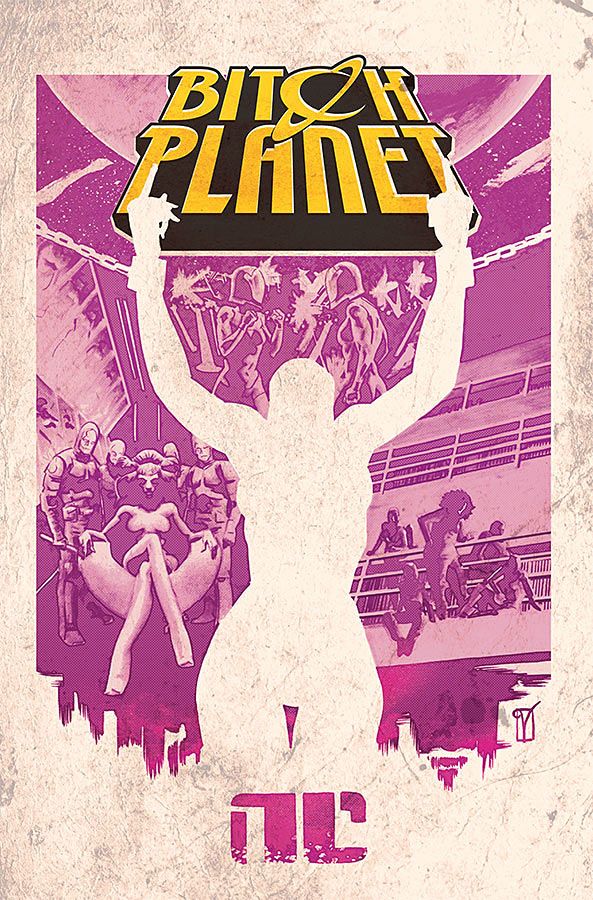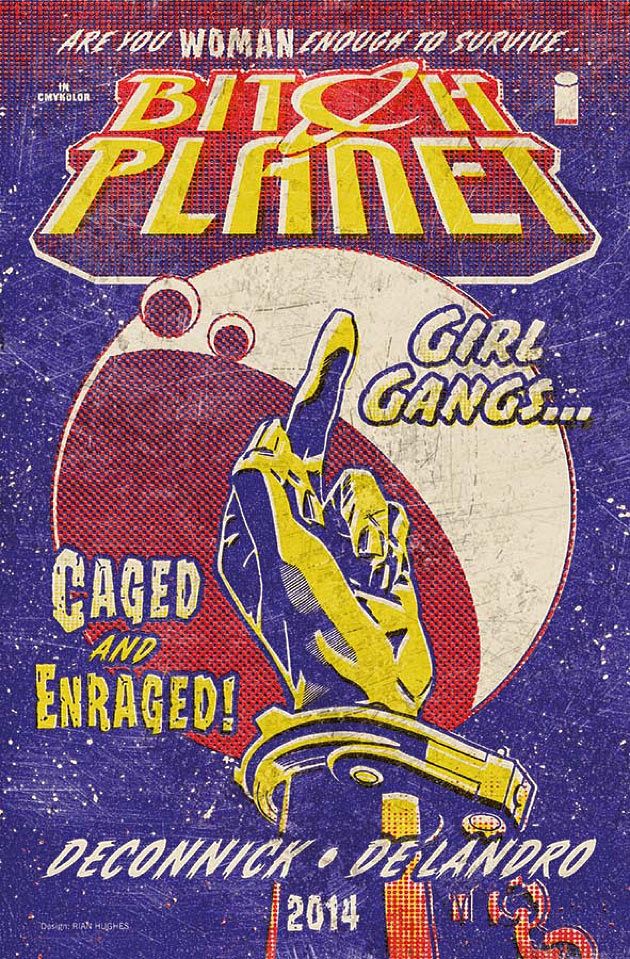Kelly Sue DeConnick has become an acclaimed and beloved comics writer because of her work on comics like "Pretty Deadly," "Ghost," "Captain Marvel" and many more comics, but she began her comics career adapting manga for English language readers. DeConnick admits that when she was initially offered the opportunity to adapt "Barbarella" for Humanoids she feared there wouldn't be enough time to do that and launch her new Image Comics series, "Bitch Planet," but the classic sci-fi series proved to be too enticing to turn down.
EXCLUSIVE: DeConnick Adapts "Barbarella" For Humanoids
The series, written and drawn by Jean-Claude Forest, has long been a cult favorite and was the basis for a film in 1968, but until now only the first volume had ever been released in an English language edition. Humanoids released the first volume of their new adaptation in a coffee table-sized edition today, which will be followed early next year by a collection of the first two volumes at standard comic size.
Given both her track record with standout female characters and the premise of the upcoming "Bitch Planet," DeConnick seems like an excellent choice to adapt the series, which itself feels like it exists on the same continuum as some of her work. DeConnick took time out of her hectic schedule to speak with CBR News about the adaptation, her connection to it and how it helped crystallize her own thinking about female characters.
CBR News: Before you got this gig, had you read any of the "Barbarella" comics?
Kelly Sue DeConnick: Sure, I'd read the first volume. I was familiar with it and with the film. I think I saw the film in high school but I wasn't an expert on it in any way.
How did it work, exactly?
I did manga adaptations for seven years and it was very similar to that -- except that the first volume had been done in English previously.
Did that make adapting the first book easier or harder?
The first one was actually harder because I felt much more self conscious about it -- I felt a lot more pressure because it had been in English previously and is, you know, kind of a classic. I went back to the French a bit to help me shake that off.
By the time I got to the second volume I had one under my belt and I felt like I had a much better grasp of it. I wasn't as nervous. I didn't have that fear of being disrespectful to the original English edition. And beyond that -- Forest also loosens up in the second volume. It's crazy pants! Just nuts. In the best possible way. That kind of delightful comic book nuts where you're like, "I don't know where this is going, I don't know what's happening here."
That's one of the things I love about comics. Things like television and movies are so expensive to produce and there are so many people who are making decisions about them. There's a lot of tried and true three-act structure, and because of that I am very seldom surprised by anything. That doesn't mean that I don't enjoy it, but there's a comfort level there. Comics are produced by comparatively few people. Five people are working on a comic, max, and often they're produced by one person! There's this energy in that that can get squashed in other, more expensive mediums. I hate when people elevate one thing by dissing another and that's not what I mean to do here, but I have a particular soft spot for comics. One of the reasons for that is because they can be so delightfully unpredictable.
I've only read the first volume, but it has a tone that's hard to describe and I'm sure it was hard to nail down in the text.
There was a lot of second guessing myself. I spent a great deal of time trying to decide whether her being referred to as "girl" constantly was a dated reference. There's also a formality to the language that I was trying to decide, is this an artifact of translation or is this part of the Science Fiction Future -- an effort to create distance? Ultimately I toned down the formality a bit but didn't do away with it. And after eliminating all of the "girls" I restored a bunch of them because I missed them. I didn't feel like it was diminishing to her and there was an awkwardness about the rhythm without it. Rhythm is very important to me in dialogue. Girl has one syllable and woman has two. [Laughs] Musically they're very different words.
WC14: DeConnick Spotlights "Captain Marvel," "Bitch Planet" & More
When you're writing your own scripts, do you spend a lot of time second guessing yourself and puzzling out the rhythm and the word choice?
Absolutely -- but I never have to worry about whether I'm being true to my own intent. I pretty much know that I know what I was thinking. I want to approach someone else's work with the same respect that I would hope my work would be given -- or will be given as foreign editions of "Pretty Deadly" are in the works right now. Having done many, many adaptations, I know that book is not going to be easy to adapt. It's going to be rough.
Before I wrote original English language comics I wrote more than 11,000 pages of adaptation. I don't think it's something to be done lightly. You have to be respectful of the original material. I've never been in the position of being able to talk to the original author. I've always had to intuit what was the tone I thought we were going for, but I think I've been fairly successful with it and I'm very proud of my work. I take it very seriously.
When "Barbarella" was offered to me, I really did not have time for it, but it seemed like too fabulous an opportunity to turn down.
Reading "Barbarella" was interesting because people talk about it as this erotic book--
It's not as naughty as you would expect, right?
No. "Barbarella" is one of those stories, and "Modesty Blaise" is another, that started in the 1960s, is considered erotic and a little transgressive, but based on how people have talked and written about it, it really wasn't what I expected.
I know. It's been a very long time since I watched the film. I consciously did not refresh my memory with the film because I wanted to focus on the book. The film was considered pretty transgressive at the time. Even today the notion of the sexually adventurous woman is peculiar for us. We don't even have the language for it. We don't have a term for it that isn't derogatory. We do for men. Today -- in an entirely different project -- I had to describe a female character that would be the equivalent of the male "confirmed bachelor." There's two ways that term can be used. It can be used as a euphemism for a closeted gay man, but it can also be something along the lines of George Clooney who's considered to be a ladies man who will never settle down. (Recently I believe he's engaged but I don't really keep up on the love life of George Clooney.) The kind of man who very clearly enjoys the company of beautiful women but is not looking for a relationship -- we don't have that language for a woman. The closest thing we had is "old maid," which has inherent judgements in it. Language reflects culture. The "cougar" thing is derogatory. It's considered bad form for a woman to have sexual appetites in her forties. That's absurd. There are a lot of things at play there. Youth obsession. The way women have been cajoled into playing into that by lying about our ages and so forth.
"Barbarella" doesn't do any of that. There's some stuff in there that feels a little dated. Particularly in the first volume -- it goes away in the second -- that, "oh my! how did that happen!" kind of thing. That feels a little silly and a little more male gaze-y than would be ideal, but for the most part she has agency and she's active. I keep getting asked if I consider it feminist and I don't know. I'm not sure that that's for me to decide. I do quite like it. Particularly the second volume, which I clearly love. I do think that it is a significant cultural marker in the sexual revolution, which was a big part of the '70s feminist movement.
When you've talked about "Bitch Planet," you talk about how much you respond to exploitation films even though you're also troubled by them on many levels.
It's interesting. As I've been trying to feed that part of my head to work on the book, my memory of these movies is very different from the actual movies. They don't age well at all. Watching them as a woman in my forties -- as opposed to a woman in my teens or twenties -- I don't find them as charming as I used to. I did not expect that. I was watching "The Arena" the other day and I just had to turn it off. I was not digging on the brutal rape scene with the romantic music underneath it. Go figure. The parts of those movies that I always respond to is the revenge. When the women have had enough and they get back at them, but sometimes I can't even get to that part.
For all the issues we're talking about around the comic, "Barbarella" is very unlike that.
It's not like that at all. "Barbarella" is not a revenge tale. It is not violent -- hyper or otherwise. It is a naughty space adventure. And the second one is delightfully weird. I know I keep saying that, but seriously, I'm obsessed with the second volume.
This may be a stretch but initially, "Pretty Deadly" felt a little like "Barbarella" with violence instead of sex.
[Laughs] Huh. Really? It feels very different to me. Less episodic for sure.
It lacks the rambling episodic nature of "Barbarella," that's true.
We don't tip our cards and show you how the pieces fit together until the third issue of volume one -- and it's not until the last page of the fifth issue of volume one that you see the big picture -- so I can see that that might not be readily apparent. "Pretty Deadly" is totally not for everybody and "Barbarella" may not be either. The tones could not be more different, but I don't hate the comparison.
You guys really need to read the second volume of "Barbarella." She gets depressed. It's very well done. You buy that she is legit bummed. She thinks she's responsible for somebody's death and it hits her really, really hard and it is so genuinely and sincerely written. In the midst of all of this weirdness, it's kind of breathtaking, really.
Is there anything that you took away from the adaptation for your own writing?
Not consciously. Wait. That's not true. I am smitten with the lettering. [Laughs] First of all there's far more text than we would have in a modern comic. They use these gigantic word balloons and the space around the words inside the balloon is huge. The balloons themselves are so clearly hand drawn. I suspect Forest must have done it himself because the line weight matches. I was really excited about that and actually showed that to Clayton [Cowles], our letterer for "Bitch Planet." I was like, "Can we have hand drawn balloons, because I love these?"
"Barbarella," and many comics like you were saying before, really feel like the singular vision of one person.
I don't know know if this is apocryphal or not but I read that Forest started doing "Barbarella" as a joke; it was a thing to entertain himself and his friends. If it is true, it makes a lot of sense to me. There's a playfulness to it. It feels like it was done by one person for a small group of people. I can't really say what it is specifically about what it is about the book that I ascribe that kind of intimacy to, but read it and see if you don't agree.
This is something I'm not sure you can answer, but while "Barbarella" may not be an influence, it does feel like it's on a continuum that some of your work is on.
Maybe. I want to be someone who is always thinking. I don't want to be static. I want to experiment and learn and grow and mess up and try different things. I don't necessarily want you to know what you're going to get when you buy a comic I worked on. I don't know if that's achievable. Whether or not we want to, as writers there are things that characterize our work whether it's certain themes we return to or styles that we prefer or tricks that we go back to again. I think some of that is probably unavoidable, but I would like to approach each book with the cumulative experience that I have and the new ideas I have for that book and try to make something that's unlike anything I've done before. I also have the good fortune to be in an incredibly collaborative art form so the book that I make working with David Lopez is different from the book that I make working with Valentine De Landro which is different from the book I make working with Emma Rios. Emma and I on "Osborn" is separated by a number of years from Emma and I on "Pretty Deadly." We've both grown and tried different things and we're at different places than we were on "Osborn." I love "Osborn," I remain proud of "Osborn," but Emma and I are older and more experienced than we were when we made that book. We have different things that we want to play with.
I would say that one thing that characterizes your work is that each project is marked by trying to create a very unique tone for each book.
Well right on, then!
"Barbarella" stands out because it has such a unique tone. We can group it with similar books, other work from the '60s and '70s, but the tone really sets it apart.
There just haven't been many female led series, and it's not just a female led series -- it is a woman who is all woman you know what I mean? [Laughs] She's so clearly the active force. Again, in the second volume more than the first. In the first volume she gets batted around a little bit more. You brought up "Modesty Blaise" earlier and I'm not a fan of the film but I am a huge fan of the novels. Modesty was like that as well. She was a woman with an unapologetic sexual appetite who was in charge of herself and in her case, her organization as well. (Although by the time we come to Modesty she's forfeited her organization and she's a free agent with Willie as her partner.) It is embarrassingly rare how often we get to see that kind of self-possessed female protagonist. I unfortunately think it's just as rare today as it was then -- which is disheartening.
RELATED: DeConnick & Rios Ride Again with "Pretty Deadly"
Book One is available now, and Book Two follows next year. Will there be more coming from Humanoids, and are you contracted for any more?
I was contracted for one and two. I know there are more. I don't know what their plans are for them. I hope that they get done -- by me or someone else.
As a final question I was asked to put to you, who are the comics pros you would have in your all-girl gang?
Becky Cloonan and Emma RÃos! Becky, Emma and I have actually discussed this very thing. We want pink satin jackets and switchblades.
Gail Simone. Marjorie Liu. Kate Leth. Annie Wu. Ming Doyle. This is a terrible question -- I'm going to leave somebody out and it's going to be awful and I'm going to feel guilty! Uh, let's see -- Fiona Staples, Chynna Clugston, Joelle Jones. Jen Van Meter and Kathryn Immonen. Though Kathryn Immonen has the best taste of any human being I've ever met and might refuse our tacky pink jackets. I've never seen her closet but I'm absolutely certain there are like six pieces and they're all perfect. She just has preternaturally great taste. I wish I could have been a Kathryn, but I'm so not a Kathryn.
Those are the names that spring to mind on the spot. I wouldn't leave anybody out, though. Anybody who wants to join is welcome in our gang. You just have to cough up for your own pink jacket.
The first Humanoids collection of "Barbarella" is on sale now.

